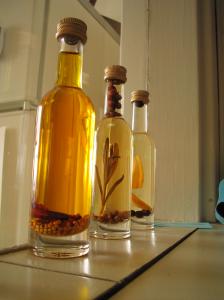FAT
Fats – all are not equal!
By Lynn Roblin MSc.RD

We keep hearing the message that too much fat in our diet is bad. For sure, a high-fat diet is related to heart disease, some cancers, diabetes and obesity. However, fat alone cannot be blamed for the increasing prevalence of overweight individuals in our society. The amount of fat in the Canadian diet has been declining over the past decades but has not halted the dramatic rise in obesity in the country over the same time period. Low fat diets are not the answer, nor are they always best. We do need some fat in our diet to provide energy, essential fatty acids and fat soluble vitamins A, D, E and K. Fats and oils should be part of a healthy diet, but the kind and amount you eat is what’s most important!
Saturated fats are found in meat, poultry skin, whole milk, cheese, butter, ice cream, egg yolks, lard, and tropical oils including palm or coconut oils. This type of fat raises both LDL “bad” and HDL “good” blood cholesterol levels.
Trans fatty acids or trans fat occur naturally in some foods, such as meats and dairy products. The trans fats found in found in many processed foods is thought to be much more of a concern. Trans fats are made when liquid fats are hardened by a process called hydrogenation. Foods containing these hydrogenated trans include commercial bakery products, snack foods including chips and crackers, and deep fried foods like fries and doughnuts. Like saturated fat, trans fats raise LDL “bad” cholesterol levels. Since trans fats have no known health benefits and certain health risks, you should limit the amount you consume.
Polyunsaturated fats are found in nuts, sesame and sunflower seeds, soybeans and their oils, and fish. Sunflower oil, corn oil and soybean oil are good sources of linoleic acid, an essential fatty acid which our bodies don’t produce. Polyunsaturated fats tend to lower over-all blood cholesterol levels.
Omega 3 fats are a type of polyunsaturated fat found in fish oils, fatty fish (salmon, sardines, herring, mackerel, rainbow trout), flaxseeds and flax oil, walnuts and walnut oil, and omega 3 enriched eggs. Omega 3 fats tend to lower triglycerides which are blood lipids involved in the development of heart disease.
Olive and canola oil and soft margarine made with these oils are high in monounsaturated fats. Monounsaturated fats lower LDL “bad” cholesterol. They are increasingly being promoted as the preferred choice of oil because they seem to play a role in increasing HDL or “good” cholesterol levels.
As you can see not all fats are equal when it comes to your health. Saturated fats should be used in moderation to cut down your total intake of fat. Oils, on the other hand, are highly unsaturated and should be used more often in meal preparation. Trans fats from processed foods should be limited.
Just because oils are more healthful doesn’t mean you should eat liberal amounts. Even in small amounts, they can contribute a significant amount of fat and calories to your diet. For example a tablespoon of vegetable oil provides 14 grams of fat and about 120 calories
Vegetable oils contain little saturated fat, no cholesterol and good supplies of vitamin E, a powerful antioxidant. Sunflower oil is the richest source of vitamin E, followed by safflower and corn oil. Salad dressings and soft margarine made with these oils also contain vitamin E.
Sunflower, corn and safflower oils are ideal for light salad dressing and for cooking. Specialty oils like walnut and sesame seed oil have a very distinctive flavour and therefore can be used in tiny amounts – about 1 teaspoon in stir-fries, for example.
Of all oils, canola oil contains the lowest amount of saturated fat. It is very high in monounsaturated fat and contains a reasonable amount of polyunsaturated fat. Canola oil has little flavour, but is useful for frying, as it has a high smoke point. It makes an excellent all purpose oil.
Olive oil is high in monounsaturated fat and is low in saturated and polyunsaturated fat. Olive oil has received a lot of attention recently because of its association with the healthful Mediterranean diet. People who follow a traditional Mediterranean diet that is low in saturated fat yet high in fat from olive oil tend to have a low incidence of heart disease.
Olive oil contains vitamin E, antioxidants and other substances, which may contribute to its apparent healthfulness. However, olive oil is not the single magic bullet to a healthful diet. The Mediterranean diet includes plenty of whole grains, fresh fruit and vegetables, legumes and only small amounts of meat and dairy products.
Olive oil comes in many flavours and can be used for high heat cooking, as well as for salad dressing, seasoning and drizzling on foods for flavour. Extra virgin olive oil is usually more expensive but contains more antioxidants and flavour than regular olive oil. “Light” on the label refers to the colour of olive oil not the fat content so don’t be fooled.
Here are a few tips about oils
- Don’t add more fat to your diet, but do substitute monounsaturated and polyunsaturated fats for those you now use.
- Read labels and avoid products containing coconut or palm kernel oil and hydrogenated oils, since hydrogenation makes fats even more saturated.
- Keep oil in a cool, dark place when you are not using it. Light and heat speed up degeneration. You can keep oils in the fridge, but they will go cloudy. Leaving oil at room temperature for a little while will clear it up.
- Use oils like canola oil in recipes that call for melted hard fats such as butter, lard or brick margarine.
- Use 3 1/2 tablespoons of oil instead of 1/4 cup of fat. Substituting oil does modify texture, usually making food softer and moister.
- Heat cooking oil before adding food so foods won’t sit in the oil for too long and absorb more of it.
- When stir-frying, use only a few teaspoons of oil or less if you have a non-stick pan.
- Instead of greasing a pan or adding fat to your frying pan, use a vegetable oil spray.
- Make your own salad dressings, using olive, canola, sunflower or safflower oil along with vinegar or lemon juice. Add fresh garlic, dried herbs and a dash of your favourite mustard.
- Avoid overheating and repeated use of oils for frying food
